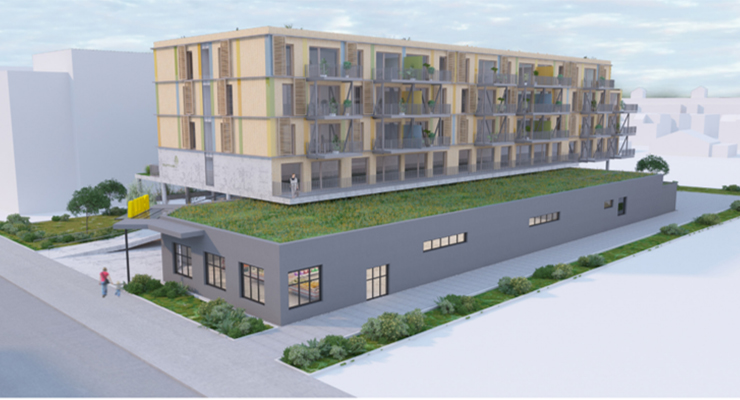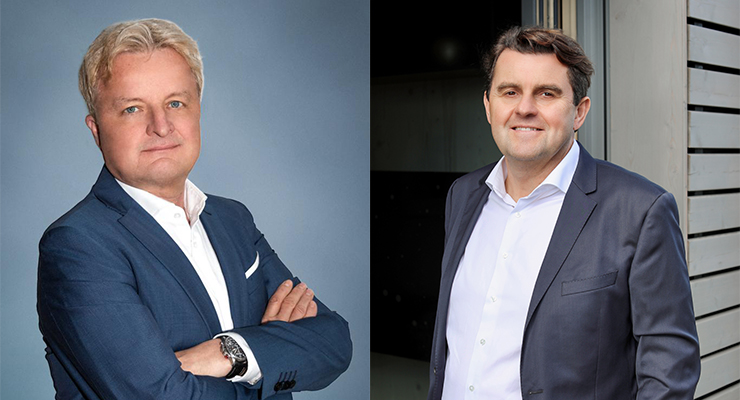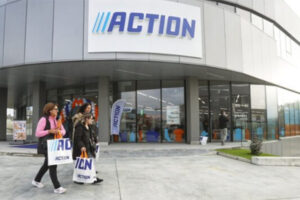ACROSS: What is the motivation behind baumhouse?
Alexander Rössler: Scarce, expensive housing in cities, climate change, and soil sealing are enormous challenges for real estate developers and urban planners. Soil sealing is considered the secret driver of the climate crisis. The goal is to create affordable and sustainable housing without sealing new land. Especially in the past two years, the energy crisis has shown that a combination of affordable housing and sustainable living is essential. baumhouse explicitly combines these two aspects. In addition to traditional housing, we also have other forms of use in mind, such as student housing, assisted living, commercial uses, coworking spaces, and other flexible forms of use.
ACROSS: Sustainability and affordability have so far been mutually exclusive in the vast majority of projects.
Dietmar Reindl: Exactly. Sustainability is a politically driven issue in the real estate industry. The requirements for real estate are already very high and will become even higher in the future. This entails enormous costs in the construction and conversion of real estate. At the same time, we see a clear trend toward a larger tenant market. Land prices have risen sharply lately, while housing is becoming increasingly scarce. With the high cost of living due to inflation and stricter lending criteria for real estate loans, consumers increasingly prefer rental housing to buying real estate. Affordable housing is needed more than ever. We firmly believe sustainability and affordability do not have to be mutually exclusive when properly addressed. We turn this supposed contradiction around and see ourselves as an impact company.
ACROSS: What does “impact company” mean?
Reindl: We recently joined the Federal Initiative Impact Investing (Bundesinitiative Impact Investing or “BIII”) in Germany. Generally speaking, impact investing means creating returns and positive environmental and social impacts. The market for impact investing was nearly 39 billion euros in 2022 in Germany alone. The mindset in society and business has changed in the face of climate change, pandemics, and social tensions. For companies in the real estate sector, the framework conditions are being redefined, and business models must be adapted accordingly.
ACROSS: What does this impact look like in concrete terms?
Rössler: Besides the environmental benefits, the most obvious impact is the price. Our understanding of affordability means we want to offer housing 20 percent below market rent. We can achieve this through maximum standardization and scaling in our project implementations.

ACROSS: What properties are you looking at, and what do partnerships with baumhouse look like?
Rössler: We work with single-story existing buildings. These offer enormous potential simply because of their large number. Specialty stores are particularly attractive. Depending on the project, these can accommodate up to six additional stories. We plan with a modular timber construction method. The wood comes from sustainably managed forests and is processed in a CO2-neutral manner using the principles of the circular economy. Another advantage of this construction method is that modules can be easily prefabricated, guaranteeing faster construction.
Reindl: The owners of existing buildings can become our joint venture partners or remain owners and grant building rights. Or they sell the existing building to baumhouse. As a company, we deliberately want to be developers and operators. We are interested in existing buildings with at least 1,500 sq m in residential suburban locations. The average size per project starts at 3,500 sq m of living space. Public transport links are also important.
ACROSS: What is the benefit for investors or owners of retail stores?
Rössler: The first and decisive advantage for investors is that they can double the commercial use of the existing property in terms of rental income in the best case. Another advantage is that a potential vacancy in retail space is much less of an issue if rental income can be generated from the residential sector at the same time. The location becomes more crisis-resistant because residential is a stable form of use. Of course, the apartments also lead to more foot traffic at the location. Another advantage is that the maintenance costs for the location decrease. Studies indicate that a property is treated with much more “care” if it is also inhabited, and thus more “under permanent observation” by the residents.
Reindl: Another very decisive advantage is the positive positioning of the company in terms of sustainability. Companies from the real estate industry must show their will to do something for climate protection. A baumhouse project is an effective and “tangible” instrument for strengthening ESG communication. In addition, the EU taxonomy targets are becoming increasingly stringent. The rating of a retail store in the energy performance certificate can be significantly improved by linking it to our residential use.
ACROSS: What are the reservations and concerns on the investor side?
Reindl: The current time and framework conditions are a challenge for us. Retail real estate owners have to realign themselves after Corona and the energy crisis. Many things are being questioned, and new projects are being approached slowly. In addition, many are still trying to understand ESG and EU taxonomy. The basic ideas and implementations of baumhouses are easy and quick to convey. However, a basic industry reflex with innovative ideas and concepts is always skepticism according to the motto: Retail parks are single-story; there is no need for another floor above, and certainly not another type of use. In my opinion, however, our mindset needs to adapt constantly and remain flexible. There are more tangible concerns regarding construction time. No retailer wants their business affected by truck traffic or construction noise, let alone have to put up with closing times.
ACROSS: How do you address these arguments and concerns?
Rössler: The so-called technical concerns can be quickly eliminated. Let’s take the construction time as an example. We estimate an average of eight months here, so that’s very fast. Many modules are prefabricated and assembled on-site. In addition, we can guarantee that the conversion will take place so that the necessary truck traffic will not run through the parking lot or close to the retail area. Of course, there will be some restrictions, but we can rule out long closing times.
Reindl: On the technical side, we have very good arguments. The product is convincing. It is more important to address the “soft” concerns and worries. That’s where perseverance is needed. Here, a significant argument is our experience and know-how. We may be a start-up on paper, but we have 50 years of combined real estate, investment, and development experience.
ACROSS: Which markets are you focusing on?
Reindl: Initially, we will focus on the Austrian and German markets. Here, we have launched the first projects. However, we see great potential for our solution in other European countries, especially in terms of cost benefits and the high level of standardization.






